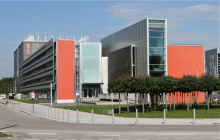This two-day "Orientation Session" is the kick-off event of the "LRZ AI Training Series", a series of courses aiming at the needs and expectations of data analytics, big data & AI users at LRZ. While focusing on these particular users and their use cases, this session as well as all other courses offered as part of the AI Training Series are, of course, open to all interested parties.
By joining this session, participants will learn about the landscape of LRZ systems and services relevant to data analytics & AI users. Further, they will be provided with the initial training of the most essential skills needed to work with these (i.e. fundamentals of GNU/Linux, SSH). Participation in this Orientation Session should be considered a mandatory requirement for anyone interested in other sessions of the series. Subsequent sessions may introduce additional requirements.
It has been about 350 years that separate the original 1673 Leibniz mechanical calculator from today's Leibniz Supercomputing Centre's (LRZ) facilities located on the Campus Garching. And yet, the spirit has not changed. To paraphrase the German mathematician: "It is beneath the dignity of excellent people to waste their time in calculation when the work could just as accurately be done with the aid of a machine."
Participants joining this course will be provided with a comprehensive walkthrough and usage guide to contemporary types of such machines which can be found at LRZ. In a general overview, historical and current developments and trends in the field of scientific computing and cluster systems will be presented. This will, amongst others, address the following questions: How do modern cluster systems work and how are they designed? How did we come to High Performance Computing, High Performance Data Analytics and High Performance AI? What makes a system adequate to a specific workload? How are these systems operated and how are they made available to their users?
In addition, an introduction to GNU/Linux and the Unix Shell as well as the use of remote systems via Secure Shell (SSH) will be provided. GNU/Linux is a family of open source operating systems, powering all different kinds of computing hardware (from mobile devices to high performance computing clusters... and pretty much everything in-between). The typical command line interface is a Unix-like shell. It serves as interactive command environment and scripting language, allowing users to control the system, and to automate tasks of varying complexity. SSH is a cryptographic network protocol, which is typically used to login and execute commands on remote (GNU/Linux) systems.
The introduction to GNU/Linux opens with a short historical overview and some common concepts & terminology will be explained. Then the focus is directed toward working with the Unix Shell. First, it will be used to navigate the file system and directories of a system, then the mechanisms of file manipulation and ownership will be explored. Additional commands and concepts will be explained, and characteristics as well as methods of manipulating the shell environment will be discussed.
Participants will be guided to install and configure a SSH client on their systems. Different applications for remote access and file transfer will be introduced. A conceptual and practical introduction to SSH keys will be given, followed by a discussion of more advanced features like SSH tunneling and custom configuration options.
These skills will then be combined to further explore typical interaction methods and usage patterns of multiuser cluster systems, including various possibilities of setting up user environments (e.g. environment variables and modules, user space package managers, containers) as well as tools for resource allocation (i.e. Slurm Workload Manager) and efficient parallelization (MPI, OpenMP, ...). Finally, an overview of different compute clusters as well as their storage systems operated by LRZ will be provided. The requirements for gaining access to these systems will be covered as well.
Participants will gain a good understanding of the characteristics of multiuser cluster systems in general and will practise basic methods of typical interaction. They will acquire essential knowledge and skills necessary to successfully interact with the command line interface of a GNU/Linux system. They will learn to use SSH in order to connect to and interact with different remote systems. They will familiarize themselves with the landscape of cluster systems available at LRZ and this will allow them to choose the right system for their own compute projects.
The material will be presented as a combination of lectures, demos and hands-on sessions, with a focus on the latter. There will be breaks during the session.
